How To Strengthen Your Microbiome
Recipe Key
Taking care of the microbes that live inside our gut – the microbiome – is one of the best things we can do for overall wellness.

The microbiome contains beneficial bacteria that help nourish our body. They support regular digestive function and play a major role in how effectively our body absorbs and utilizes nutrients. This is also where a majority of our immune system function takes place.
These microbes help control everything from inflammation to how much energy we get from our foods. They also affect the production of mood-regulating neurotransmitters like serotonin which influence our moods and perhaps even what foods we crave.
As a health coach I help my clients find easy, delicious and soothing ways to support their microbiome.
Humans need a diverse microbiome with a variety of bacterial species that can quickly adapt to the wide range of foods that you might eat and the stress you may encounter in your life. So, what are some things that you can do to support a healthy, diverse microbiome?
Tips to Strengthen & Maintain a Healthy Microbiome
Get Enough Fiber
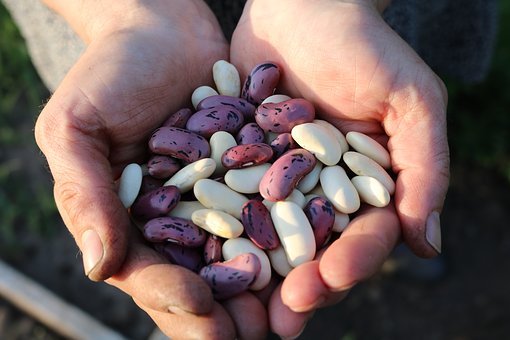
According to Harvard School of Public Health adults need between to 25-35 grams of fiber per day for good health. Yet, many Americans get less than 15 grams a day.
Fiber has some very cool benefits:
- Scrubs the gut of excess mucus and toxins
- Feeds the good bugs that proliferate in the microbiome
- Promotes healthy elimination
- Helps support healthy blood sugar levels
- Makes you feel satisfied and full
- Helps reduce bad cholesterol (LDL)
You can get fiber in your diet from whole foods such as leafy greens, fresh vegetables, fresh fruits, beans, legumes, nuts, seeds and whole grains.
NOTE: If you have a low fiber diet, increase your intake slowly and gradually. If you increase the fiber too fast, you may experience some gas, cramping, and bloating.
Drink Lots of Water
Generally speaking, it’s good to drink about half of your ideal body weight in ounces of water per day. If you engage in a lot of physical activity you may need a bit more. If you’re lying around all day a bit less.
Eat Vegetables That Improve Your Microbiome
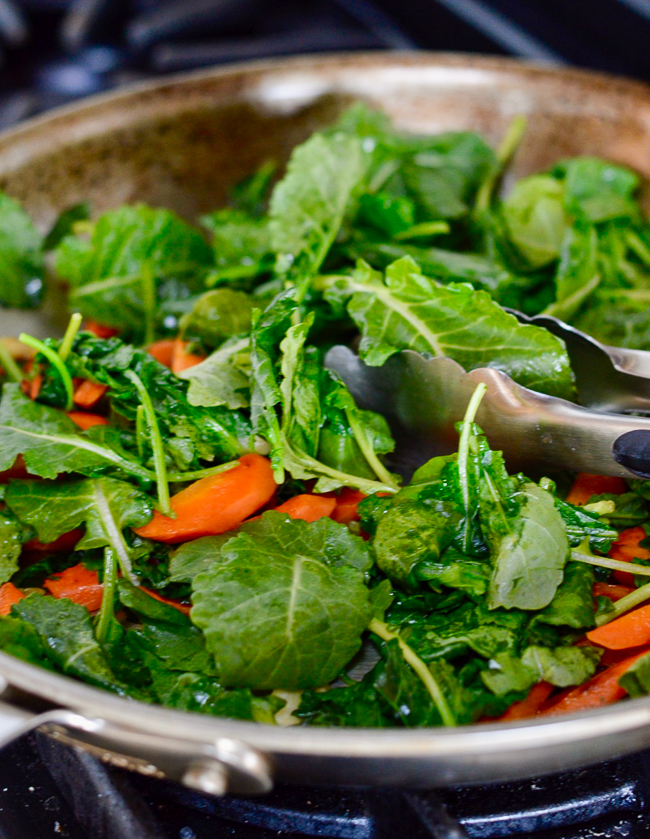
Including a variety of the top vegetables for digestion in your diet is a great way to boost your body’s ability to process nutrients efficiently. Here are a few good ones:
Artichokes are high in fiber and the prebiotic inulin.
Broccoli protects your gut microbiome. (2)
Green Leafy Vegetables provide vitamins, minerals, phytonutrients, antioxidants and lots of fiber.
Squash, all types are good. They are easy to digest and provide insoluble and soluble fiber.
Celery contains a type of polysaccharide (or sugar) that can improve the lining of your stomach and improve digestion. Read about benefits of celery here.
NOTE: Cooked vegetables are easier to digest. If you’re not used to eating raw vegetables, start slowly. They can put a lot of strain on your digestive system.
Eat Fruits That Improve Digestion
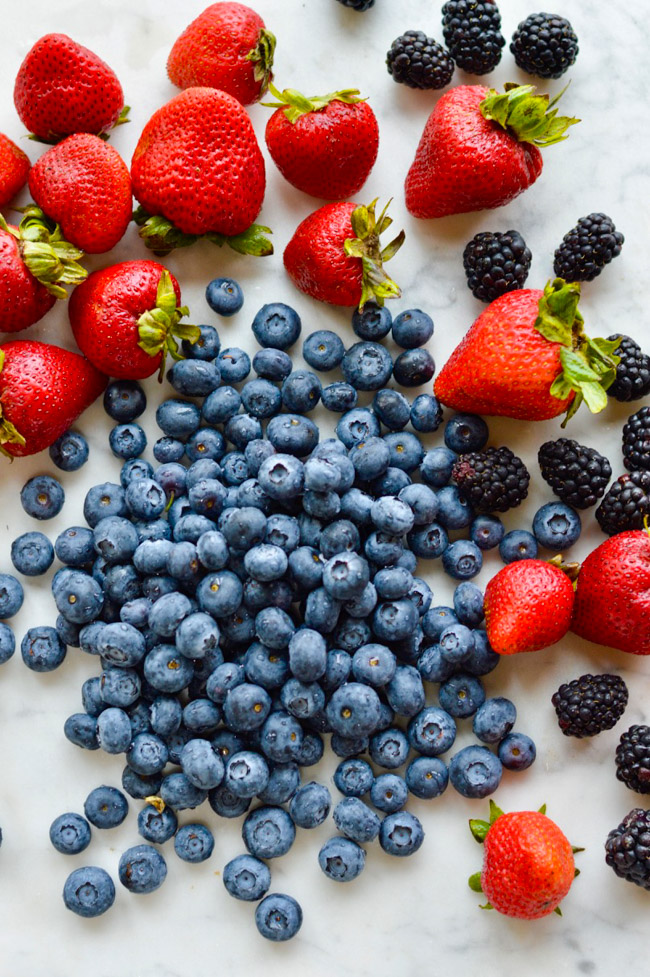
Fruits are an easy and effective way to increase your intake of fiber and improve your digestive health.
Here is a list of common powerful fiber-rich fruits for digestion which will help keep things moving through your digestive tract.
- Raspberries 8 grams of fiber per cup*
- Pears (include skin) 5.5 grams of fiber per fruit*
- Apples (include skin) 4.4 grams per fruit*
- Blackberries 7.6 grams per cup*
- Figs 2 grams in 1 large fig
- Strawberries 2.9 grams per cup*
- Avocado 10 grams of fiber per 1 cup sliced avocado
*Buy organic as these are heavily sprayed.
Add these fruits to your breakfast, include them in your salads, enjoy as a snack or use them in your favorite desserts.
Eat Probiotic Rich Foods
Eating plenty of probiotic-rich foods is one of the best things you can do for overall wellness. These beneficial bacteria help nourish your microbiome.
Here are a few probiotic rich foods to try:
- Sauerkraut
- Miso
- Kimchi
- Yogurt (dairy or non-dairy)
- Tempeh
- Kombucha (check for caffeine and sugar)
Create a Routine to Reduce Stress
Stress alters the microbiome causing gut inflammation. Even short-term exposure to stress can impact the microbiota. Finding a way to soothe yourself is key to having a healthy microbiome.
Managing stress can be anything that works for you. Meditation, deep breathing, bhastrika breath, warm baths, playing tennis, kayaking, walking in nature, reading, the options are endless.
Movement Benefits Your Microbiome
Recent studies indicate that exercise has a number of benefits for the gut microbiota. It is linked to increases in the number of beneficial microbial species and enriching microbial diversity as well as enhanced short-chain fatty acid synthesis and carbohydrate metabolism.
Movement can be, dancing around your living room, a yoga class at home or in a studio, a walk around your neighborhood, rebounding or a bike ride. Any movement is good movement!
Eat Balanced Meals to Improve Digestion
For each meal aim to get protein, healthy fat, starchy carbohydrates or fruit, non-starchy vegetables, and a delicious element (spices and sauces that make your food taste good).
I recommend half your plate be non-starchy vegetables, the other half divided evenly between, protein, starchy carbohydrates and fat.
Eating balanced meals will keep you feeling full after meals, energized for your day, and will improve your digestion.
Sleep Affects Your Microbiome
Research has shown there is a back and forth relationship between our microbiome and our sleep. The health of our microbiota has an effect on how well we sleep. And the quality and quantity of our sleep affects the health and diversity of the important bacterial world that lives in our gut. (4)
To help improve your sleep and microbiome here are Tips To Sleep Better and Wake Up Refreshed.
*******
Now that you have some ideas to maintain a healthy microbiome, see what works best for you. Try one tip at a time and give yourself time to try it out in your life.
Here are a few recipes that are good for your microbiome:

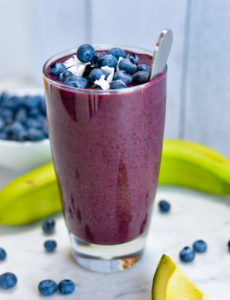
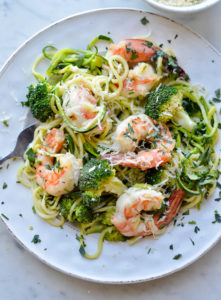
Minestrone Verde Balancing Blueberry Smoothie Shrimp with Broccoli & Zucchini Noodles
Always be gentle to yourself. If you’re not used to consuming the high fiber fruits and vegetables or probiotic foods daily take it slowly. Add in a small amount of them each day and work your way up. You don’t want to overload your system.
If you find that you’re struggling to create a routine to fill your body with foods that support your microbiome or reduce stress on your own, know that you can always reach out to me to set up a few sessions to help you feel your best every day.
